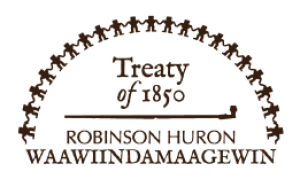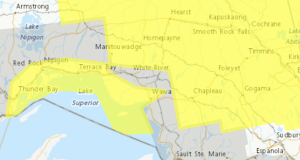RE: Opposition to Bill C-5 and Its Implications for First Nations Rights and Jurisdiction
Dear Prime Minister Carney,
On behalf of Robinson Huron Waawiindamaagewin, representing the Anishinaabe signatories to the Robinson Huron Treaty of 1850, we write to express our opposition to Bill C-5, the proposed Building Canada Act, and the process by which your government is advancing this legislation.
The Chiefs of Ontario Leadership Council have already passed a resolution strongly opposing both the content of Bill C-5 and the undemocratic process being used to rush it through Parliament. We unequivocally support and echo this position.
Bill C-5 grants sweeping new powers to a single federal minister, enabling the fast-tracking of major infrastructure projects while bypassing regulatory protections, environmental assessments, and essential social safeguards. Such an approach represents a serious breach of the Crown’s constitutional and Treaty obligations. The Crown has a duty to honour not only the legal commitments embedded in our Treaties, but also the foundational expectation that our free, prior, and informed consent must guide decisions affecting our lands, rights, and futures.
The path Bill C-5 sets is not one of reconciliation — it is one of regression. It actively undermines the commitments Canada has made under the United Nations Declaration on the Rights of Indigenous Peoples (UNDRIP), including the principles of free, prior, and informed consent and the recognition of First Nations’ distinct rights and jurisdiction.
We raise the following grave concerns:
- The legislative process has been rushed and opaque, with insufficient consultation with First Nations governments, including Robinson Huron Treaty Nations.
- The definition of “national interest” is vague and does not account for the priorities, perspectives, or rights of First Nations peoples.
- The Bill fails to address actual First Nations infrastructure priorities, such as closing the infrastructure gap in our communities.
- Meaningful consultation is impossible without detailed project descriptions and impact assessments, yet the bill permits ministerial approvals without such information.
- The federal rationale for excluding Parliament and rights holders from these decisions demonstrates a troubling disregard for democratic accountability and First Nations governance.
These omissions represent a significant step backward in the Crown–First Nations relationship. Fast-tracked infrastructure projects approved under this bill are not only likely to face legal challenges and direct action — they also risk irreversible damage to our lands and waters due to insufficient scrutiny.
This legislation, as currently drafted, violates the spirit and intent of the Robinson Huron Treaty, stands in direct conflict with Canadian, international, and Anishinaabe law, and most critically, fails to uphold the honour of the Crown.
The path Bill C-5 sets is not one of reconciliation — it is one of regression. It actively undermines the commitments Canada has made under the United Nations Declaration on the Rights of Indigenous Peoples (UNDRIP), including the principles of free, prior, and informed consent and the recognition of First Nations’ distinct rights and jurisdiction.
Bill C-5 also erodes the honour of the Crown which the Supreme Court of Canada instructs Canada in Ontario (Attorney General) v. Restoule 2024 SCC 27, that the Crown must act honourably in dealing with treaty rights holders. The Crown’s honour is always at stake.
We call upon your government to:
- Immediately halt the passage of Bill C-5;
- Work collaboratively with First Nations to co-develop any legislative changes that affect our lands, rights, and futures.
If this government insists on pushing forward without our consent, it will not only face fierce legal and political opposition — it will erode any trust remaining in the Crown–First Nations relationship.
We demand you to change course.
Meegwetch,
Gimma (Chief) Scott McLeod,
Lake Huron Regional Chief of the Anishinabek Nation
Member of the Robinson Huron Waawiindamaagewin Political Working Group
And
Dean Sayers,
Spokesperson for the Robinson Huron Treaty Chiefs and;
Member of the Robinson Huron Waawiindamaagewin Political Working Group
Cc:
- Honourable Mandy Gull-Masty, Minister of Indigenous Services Canada
- Honourable Greg Rickford, Ontario Minister of Indigenous Affairs
- National Chief Cindy Woodhouse-Nepinak, Assembly of First Nations
- Ontario Regional Chief Abram Benedict, Chiefs of Ontario
- Dr Albert K. Barume, United Nations Special Rapporteur on the Rights of Indigenous Peoples
Latest posts by This Media Release (see all)
- Thrift Shop Thanks the Community - February 24, 2026
- Bus Cancellations (Wawa, White River & Dubreuilville) - February 24, 2026
- Chiefs of Ontario Urges Immediate Action on Highway Safety After String of Fatal Collisions - February 23, 2026
 Wawa-news.com Local and Regional News
Wawa-news.com Local and Regional News


